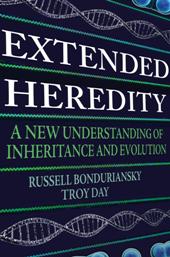 Bonduriansky and Day's book Extended Heredity: A New Understanding of Inheritance and Evolution is now available. The topic area has a big overlap with the topic area here. The Amazon blurb reads:
Bonduriansky and Day's book Extended Heredity: A New Understanding of Inheritance and Evolution is now available. The topic area has a big overlap with the topic area here. The Amazon blurb reads:
For much of the twentieth century it was assumed that genes alone mediate the transmission of biological information across generations and provide the raw material for natural selection. In Extended Heredity, leading evolutionary biologists Russell Bonduriansky and Troy Day challenge this premise. Drawing on the latest research, they demonstrate that what happens during our lifetimes--and even our grandparents' and great-grandparents' lifetimes―can influence the features of our descendants. On the basis of these discoveries, Bonduriansky and Day develop an extended concept of heredity that upends ideas about how traits can and cannot be transmitted across generations.By examining the history of the gene-centered view in modern biology and reassessing fundamental tenets of evolutionary theory, Bonduriansky and Day show that nongenetic inheritance―involving epigenetic, environmental, behavioral, and cultural factors―could play an important role in evolution. The discovery of nongenetic inheritance therefore has major implications for key questions in evolutionary biology, as well as human health.
Extended Heredity reappraises long-held ideas and opens the door to a new understanding of inheritance and evolution.
The book looks interesting and it is certainly a welcome contribution to the literature on the topic, but it fairly quickly aroused my critical faculties. Check out page 19, to start with. The authors present a classification scheme for heredity, listing, genes, self-regenerating factors, non-self-regenerating factors, structural inheritance and epigenetic inheritance. It seems half-baked to me.
The authors seem rather obsessed with biological systems. If they are "extending" heredity, are they extending it to physics and to inorganic systems outside biology? Apparently not. In which case the authors are not really embracing the "extension" part of their thesis very well. Darwinian evolution, properly understood, applies to a range of inorganic physical systems and is not limited to biology.
The authors bemoan the dominant "gene-centric" view of heredity apparently without considering the possibility that all inheritance is mediated by genes by definition of the term "gene". If the gene really is the unit of heredity, then the "epigenetic inheritance" category they apparently favor becomes an oxymoron.
I searched for "memes": 1 hit. I searched for "universal darwinism": 0 hits. Universal Darwinism pioneers Blackmore, Plotkin and Dennett each get 0 mentions. It all seems like pretty poor coverage to me.
Here is one author's page about the book.










No comments:
Post a Comment